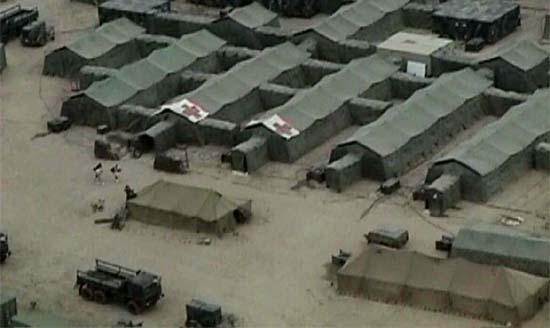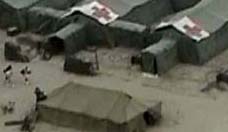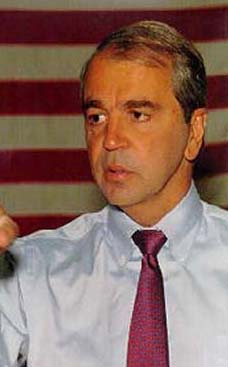
I'd like to say that there is a long tradition of many, many volunteers who have served both in the military service and in Peace Corps. The important distinction is that's an individual choice. They are not recruited into the military with the formal option of participating in Peace Corps, providing an incentive, either a financial incentive of $5,000 or loan rebatements, and it's this creation of a formal program without the active involvement of Peace Corps where -- without thinking of what the implications might be for the security of serving volunteers is what is very problematic for the community, and we do hope to work with members of Congress to take a look at this and to see if we can address this legislatively in the very near term.
Are Pentagon Ties Endangering Volunteers? A discussion of the issues
War and Peace Corps: Are Pentagon Ties Endangering Volunteers?
Peace Corps volunteers are raising alarm bells about legislation that allows the U.S. military to recruit young people by holding out the option of a two-year stint in the Peace Corps to fulfill service obligations. We speak with the National Peace Corps Association, a Washington Post reporter, the U.S. Army Recruiting Command, and a Peace Corps parent. [includes rush transcript] As the U.S. military scrambles to meet recruiting goals, controversy is emerging over a new initiative that allows members of the armed forces to join the Peace Corps to fulfill part of their eight year service obligation. On Tuesday, the Washington Post published an article on the Peace Corps option for military recruits. The partnership was established through legislation backed by Senators John McCain and Evan Bayh and passed two years ago by Congress. It's only now, though, that the miliatry is heavily promoting the Peace Corps option to recruits through its National Call to Service program. And 2007 will see the first batch of recruits who will be eligible to participate in the Peace Corps after fulfilling a 15-month stint in the military. The program is part of the Individual Ready Reserve, which consists of active duty troops and trained military personnel who can be called up to active duty to fill vacancies.
Founded in 1961 by President John F. Kennedy, the Peace Corps aims to promote "world peace and friendship." Currently, more than 7,700 volunteers and trainees are enrolled in the program and serve in 72 countries around the world. Now, current and former participants are raising concerns that a direct tie to the Army will compromise the independence of the agency and potentially endanger participants by identifying them with U.S. military policies around the world. Peace Corps director Gaddi Vasquez told the Washington Post that the agency was unaware of the National Call to Service program until it was already passed into law.
We invited the Peace Corps on the show today, but they were unavailable to join us. The Peace Corps provided us with a statement from Vasquez that reads, "Ultimately, the impact to Peace Corps in terms of how we recruit, who we accept into service, remains very much intact and consistent with what we've done for 40-plus years. I am an individual who embraces a very important facet of Peace Corps, and that is the Peace Corps' independence as an agency within the executive branch."
After the Washington Post article came out, we were contacted by the parents of a Peace Corps volunteer who is just about to leave for Africa. They did not want to reveal the identity of their son, but said the Peace Corps had originally assigned him to a Muslim country just after stories of Koran abuse at Guantanamo hit the news. He was concerned for his safety as an American and asked to be transferred to another country. Eventually he was assigned to a country in Africa.
* Stan Andrews, parent of a current Peace Corps volunteer about to leave for Africa. He is a former international research administrator, and used to be director of the Division of Sponsored Research at Florida Atlantic University. Speaking from his home in Maine.
* Alan Cooperman, author of the Washington Post article published on Tuesday.
* Kevin Quigley, director of the National Peace Corps Association, which represents former Peace Corps staff and volunteers.
* Douglas Smith, with the U.S. Army Recruiting Command in Fort Knox, Kentucky.
RUSH TRANSCRIPT
This transcript is available free of charge. However, donations help us provide closed captioning for the deaf and hard of hearing on our TV broadcast. Thank you for your generous contribution.
Donate - $25, $50, $100, more...
AMY GOODMAN: Yesterday, the Washington Post published an article on the Peace Corps option for military recruits, and we're joined on the phone by the author of that piece, Alan Cooperman. Welcome to Democracy Now!
ALAN COOPERMAN: Thank you.
AMY GOODMAN: Can you just lay out what it is you learned, and specifically is it possible that the Peace Corps, the head of the Peace Corps, didn't even know that this option was in place until now?
ALAN COOPERMAN: Well, what I learned was that this program has really been in effect for more than two years. The legislation was actually passed in 2002. But very few people in the Peace Corps seem to know anything about it. I contacted Peace Corps -- current Peace Corps workers around the world. Virtually none of them had heard of it. I contacted a lot of Peace Corps former officials, well-known folks around the country, some of the founders of the Peace Corps. They were unaware of the details of this program, and many had no idea that the program even existed. And the reason is because it's really only now going into effect. Nobody has yet entered the Peace Corps through this route. Now, in all fairness to the sponsors of the legislation, it's clear, I think, that they intended this both to be a tool for military recruiting and, I think, in their minds, to be something good for the Peace Corps. I think that the idea was [inaudible] national service of all varieties, whether it be serving in a New York City inner city school as a teacher through AmeriCorps or in an African village through the Peace Corps or in the military, that all of those are valid forms of national service that should be honored, and in some sense, honored equally. And I think that that was the underlying intent of this legislation, but you are quite right that once word about it began to filter through the Peace Corps, and now it has begun to move very rapidly through the Peace Corps, quite a bit of concern has built up and I think growing opposition, and I think there are going to be moves to try to change the program legislatively.
AMY GOODMAN: Alan Cooperman wrote the piece on the Peace Corps-Pentagon partnership in the Washington Post yesterday. He are joined in our Washington D.C. studio by Kevin Quigley, who is head of the National Peace Corps Association, which represents former Peace Corps staff and volunteers. Your response, Kevin Quigley.
KEVIN QUIGLEY: Amy, first, good morning, and thank you for focusing attention on this important issue. And as Alan just said, this really isnít a partnership between Peace Corps and the Pentagon, because Peace Corps wasn't consulted when the legislation was developed. And also, I think the authors of the legislation, Senator McCain and Senator Bayh, had a good intention. As we heard in the earlier segment, Paul Hackett was talking about the importance of service, and that it is one of our core American values, but we in the Peace Corps community believe very strongly that it's important to make a distinction between military service and Peace Corps service, as well as to maintain an independent Peace Corps. We think that's essential for the viability of the organization. And I would say this is not really a partisan issue. Over the last few weeks, as this story has emerged, we have consulted widely in the Peace Corps community, including with former Republican directors of Peace Corps, and they also share our concerns about what impact this program is going to have on the independence of Peace Corps, and would it adversely affect the security of serving volunteers.
AMY GOODMAN: We're also joined on the telephone by Douglas Smith from the U.S. Army Recruiting Command in Ft. Knox, Kentucky. We're going to break, and then we'll get his response.
[break]
RUSH TRANSCRIPT
This transcript is available free of charge. However, donations help us provide closed captioning for the deaf and hard of hearing on our TV broadcast. Thank you for your generous contribution.
Donate - $25, $50, $100, more...
AMY GOODMAN: We talk about the Peace Corps and the Pentagon. Joining us on the line, Alan Cooperman, who wrote the piece in The Washington Post; Kevin Quigley, National Peace Corps Association; and Douglas Smith from the U.S. Army Recruiting Command in Ft. Knox, Kentucky. Your response to Kevin Quigley's concerns about the Peace Corps being partnered with the Pentagon.
DOUGLAS SMITH: Well, I have nothing to say about that. All I can tell you is that a National Defense Authorization Act for fiscal year 2003 directed Department of Defense to implement this program across all of the services. This is not just an Army program.
AMY GOODMAN: So, can you tell us, Douglas Smith, when you are recruiting or when you have your people recruiting, do you say, you can go to Iraq and to the Peace Corps after?
DOUGLAS SMITH: I don't know that we would say it that way. We would explain that basically this program, whether you join the Army, the Navy, the Air Force or whatever, you serve -- first you go through your basic training and learn your particular military skill. Then you serve 15 months on active duty, followed by two years of reserve service with a reserve unit among one of the military services, and then the remainder of your eight-year obligation can be spent either in the stand-by reserve or with a reserve unit or with the Peace Corps or AmeriCorps or a program of that sort.
AMY GOODMAN: Kevin Quigley, your response?
KEVIN QUIGLEY: Well, we, as I said a moment ago, we think it's very important to promote national service. We do think that there's a distinction between serving as a teacher in the United States as opposed to serving as a volunteer where your very security and the success of your assignment is dependent on your being integrated into a host community. And also that there's been a long history, as I think Gaddi Vasquez points out in his letter or his statement, of Peace Corps volunteers who have served honorably both in the military and in Peace Corps. But there was no formal linkage. This was an individual choice made by someone who had served in the military, had been discharged, and then -- or was on independent ready reserve and then at that point in time opted to apply to Peace Corps and was selected. What concerns the community is this formal linkage between a recruitment program that is encouraged, trying to encourage new recruits into our armed services, and with the formal linkage into the Peace Corps program.
AMY GOODMAN: Well, I wanted to bring in another guest, Stan Andrews. After The Washington Post article came out yesterday, we were contacted by the father of a Peace Corps volunteer who is about to leave for Africa. They didn't want to reveal the identity of their son, but said the Peace Corps had originally assigned him to a Muslim country just after stories of Koran abuse at Guantanamo had hit the news. He was concerned for his safety as an American, asked to be transferred to another country. Eventually, he was assigned to a country in Africa. We're joined on the line from Maine by the father of this young man, Stan Andrews is with us, a retired international research administrator. Can express your concerns, and then we can get Douglas Smith's response from the U.S. Army Recruiting Command in Ft. Knox.
STAN ANDREWS: Good morning, Amy. Thanks for having me on.
AMY GOODMAN: Itís good to have you with us.
STAN ANDREWS: My main concern is as a parent, and basically I'm concerned because when my son was first asked to serve in a Muslim country, this was right after we had the eruption from Newsweek, disclosures about the trashing of the Koran, and my son turned down the country primarily because it wasn't that he didn't want to serve, but he didn't want to have to be serving in a place where he felt he would be ineffective because he would be constantly having to try to defend our policies in Iraq and elsewhere. And then, when the second opportunity came up, he's very happy about going over and serving. He's grown up in a Quaker household where we believe in service to community, and he's looking forward to this assignment.
But the problem as parents that we have with this policy that is being implemented by the military right now is that it really puts the Peace Corps on a collision course with our military aspects of our foreign policy. And it also basically may have the effect of putting our children in harm's way because of this policy. I look back at the Peace Corps over many years, and my wife and I have always viewed the Peace Corps as an institutional treasure of how to transmit our values of democracy and freedom. The Peace Corps has survived several storms and maintained their institutional integrity during this period of time. And I canít imagine a worse type of scenario than for people overseas to presume that the Peace Corps is back to Camelot, back to the business of basically providing spies in various aspects of a country's development.
AMY GOODMAN: Stan, your wife was talking to our producer, Nell Geiser, and she said to her, ĎFirst we kill them, then we teach them to read.í Douglas Smith of the U.S. Army Recruiting Command at Ft. Knox, your response.
DOUGLAS SMITH: My question has to be this. Are you saying that the Peace Corps does not want people who have served in the military ever in their lives? Is that what the Peace Corps is looking for, is exclude a whole segment of society from volunteering to serve in the Peace Corps? Because that's what this program is. The people who have enlisted through this program have the option of either staying with an army reserve unit or the reserve unit of the military service they enlist in, going into the stand-by reserve, or volunteering to be in the Peace Corps or AmeriCorps. So, the attitude of some of your callers seems to be that the Peace Corps does not welcome anyone who has had military service, and I think that's -- that just sounds wrong to me.
AMY GOODMAN: Let's end with Kevin Quigley. Your response to Douglas Smith of the U.S. Army Command.
KEVIN QUIGLEY: I'd like to say that there is a long tradition of many, many volunteers who have served both in the military service and in Peace Corps. The important distinction is that's an individual choice. They are not recruited into the military with the formal option of participating in Peace Corps, providing an incentive, either a financial incentive of $5,000 or loan rebatements, and it's this creation of a formal program without the active involvement of Peace Corps where -- without thinking of what the implications might be for the security of serving volunteers is what is very problematic for the community, and we do hope to work with members of Congress to take a look at this and to see if we can address this legislatively in the very near term. Thank you.
AMY GOODMAN: Last comment to Stan Andrews, dad of the young man who is headed to Africa right now to be in the Peace Corps. Well, Iíll put the question to, then, Kevin Quigley. It's interesting that the Congressional legislation that was passed is by -- passed by two -- well, possibly potential presidential candidates, one Republican, one Democrat: Evan Bayh and John McCain. Your thoughts on that?
STAN ANDREWS: I would just echo my earlier comment that national service is a core value, as Stan Andersen talked about. It's something thatís key for many communities. Paul Hackett spoke eloquently about it early in the program. And I want to be very clear that your viewers and listeners understand that the Peace Corps community embraces the concept of service, we just think that there is a very important distinction between military service, AmeriCorps service and Peace Corps service.
AMY GOODMAN: Well, I want to thank you all for being with us, Kevin Quigley, President of the National Peace Corps Association; Alan Cooperman, who wrote the piece in The Washington Post; and Douglas Smith, U.S. Army Recruiting Command in Ft. Knox, Kentucky; Stan Andrews, also on the line with us, his son headed to the Peace Corps in Africa.
To purchase an audio or video copy of this entire program, click here for our new online ordering or call 1 (888) 999-3877.











